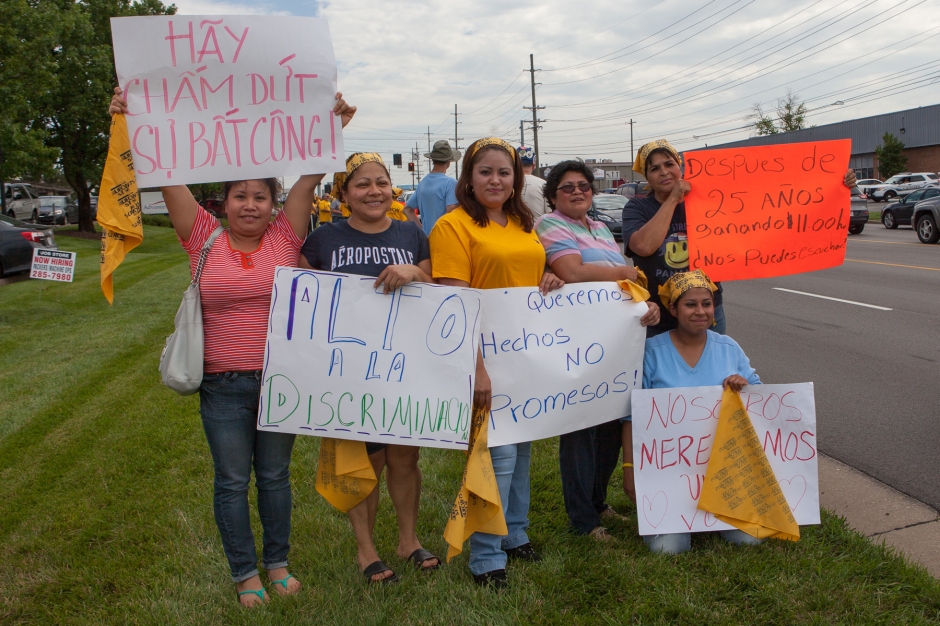A federal judge found that Blue Ash-based AdvancePierre Foods disciplined employees in retaliation for their union activities, conducted unlawful surveillance of employee union activity, and in other ways unlawfully interfered in the rights of employees to unionize about 600 workers at its West Chester plant in 2015.
The June 27 decision by an administrative law judge with the National Labor Relations Board followed a six-day trial in Cincinnati. AdvancePierre was represented by attorneys from Thompson Hine LLP.
AdvancePierre–a producer and distributor of sandwich products with about 4,100 employees, all non-union, in 11 locations and $1.6 billion in net sales–is appealing the decision. The company’s July 25 appeal takes exception to all the proposed remedies and the recommended order in the judge’s decision.
The matter now goes to the full National Labor Relations Board to decide. Board decisions may be appealed to the U.S. Court of Appeals and ultimately to the U.S. Supreme Court. At any time, AdvancePierre could opt to settle the matter.

According to the judge’s decision, organizers from United Food and Commercial Workers Union Local 75 met with AdvancePierre employees at the West Chester plant in spring 2015, after Sonja Guzman, an employee who was later disciplined, contacted the union.
Even before the union’s first openly publicized meeting on May 11, 2015, AdvancePierre learned about the union organizing campaign and “moved quickly to oppose unionization,” according to the judge.
Union organizers and employee supporters openly distributed informational materials and union authorization cards at the entry and exits of the AdvancePierre parking lots. Employees also distributed materials and solicited support in the plant breakroom.
The director of human resources for AdvancePierre testified at trial that there are at least five languages spoken by plant employees.

By the end of May 2015, approximately 165 cards had been signed by employees authorizing the union to be the exclusive bargaining representative in negotiations with AdvancePierre. If 30 percent of the 600 employees signed union authorization cards, a secret ballot election could be called. If more than half signed, then a union could be certified without the need for an election.
In response to the union campaign, the company hired a consultant to advise on union avoidance strategies, posted a solicitation/distribution policy restricting employee organizing activity, and stopped production lines five or six times over as many weeks so supervisors could give anti-union literature to production workers.
Between June and October 2015, UFCW filed several charges of unfair labor practices with NLRB District 9 based in Cincinnati. AdvancePierre denied all allegations. The District 9 director investigated the charges and concluded that a formal complaint and hearing were in order.
The decision found that AdvancePierre, in addition to the violations noted above, enforced an overly broad policy that illegally prohibited employees from soliciting interest in unionizing and distributing union literature in the breakroom on non-work time. AdvancePierre said the illegal policy, which was in effect for one month at the start of the union campaign, was an outdated policy from 2001 that was mistakenly posted instead of a lawful policy from 2012.
The decision also found that AdvancePierre’s implementation of a grievance system during the union organizing campaign was unlawful because it implied that AdvancePierre was promising to remedy grievances and improve working conditions in lieu of a union.
The decision dismissed allegations that AdvancePierre unlawfully solicited employees to withdraw union authorization cards. The judge found that AdvancePierre did not assist or offer assistance to revoke the authorizations, and the company did not seek to determine whether employees actually withdrew their authorizations. Additionally, there was no evidence the company created a coercive atmosphere for employees.
The decision also dismissed the allegation that AdvancePierre restructured its pay plan in August 2015 in order to discourage union support. The judge found legitimate business reasons as the motive for the timing and implementation of changes to the pay plan.
Among the remedies, the judge ordered AdvancePierre to fully reinstate a suspended employee, to rescind unlawful disciplinary warnings, and to remove references to the suspension and the disciplinary warnings from corporate files.
The judge in the case, David I. Goldman, has served as an NLRB judge since 2005.

The Board may not rule on AdvancePierre’s appeal for many months and possibly as long as a year, according to Rick Gill, a former NLRB attorney now in private practice in Cincinnati.
AdvancePierre Foods was ranked as the second largest privately held company in the Cincinnati region in 2015. At the time, it was owned by Oaktree Capital Management, a private equity company. In August 2015, C4AD wrote about the tensions between AdvancePierre employees and Oaktree.
On July 14, the AdvancePierre went public with an initial offering of 21,390,000 shares of common stock. The prospectus for the stock offering identified unionization as a risk factor for AdvancePierre’s business: “If some of our employees were to become unionized, it could adversely affect productivity, increase labor costs and increase the risk of work stoppages at our facilities.”
The WSJ reported that on July 20 Oaktree sold 8,630,190 of the newly issued shares at $21 per share, a sale transaction valued at $181 million. Oaktree continues to own a majority of the voting power of all outstanding shares of common stock. As a result, AdvancePierre is regarded as a “controlled company” by NYSE corporate governance standards.
By Mike Brown, mbrown.c4ad@gmail.com
